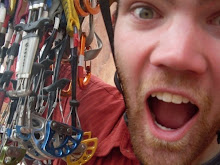In our western culture we have a notion that perfection is necessary to achieve excellence. We may achieve near perfect, yet find our selves or others telling us to refine in hopes of attaining perfection. In education, whether experiential or not, what happens when we become more concerned with engagement rather than attainment?
I believe it is exciting to redefine what is good enough. As an experiential educator, I can free my self from concern of a level of effort, and refocus on the experience itself. In other words, aiding students in developing the skills to identify for themselves what is and is not important in achieving excellence. Even in our day to day lives, what is good enough becomes a relative question. What tasks truly deserve our attention?
I purposely leave this post here. Instead of trying to define what is good enough, I leave with a finishing quote, so that you can choose weather or not it is a task that deserves your attention.
"Anything worth doing is worth doing poorly"
-Chesterton
